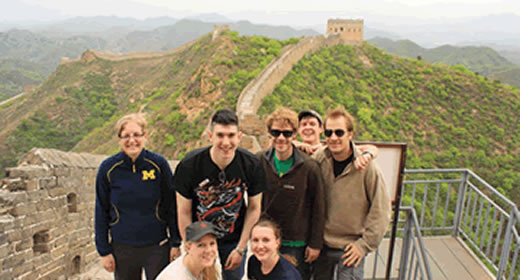
New course takes students and faculty to China to study contemporary policy
Ford School Assistant Professor Philip Potter developed a new course last spring that introduced MPP students to contemporary Chinese public policy in a rather interactive way—by going to China.
"China is a crucially important country, and we have many students who are interested in its politics, so it was an obvious choice for this program," said Potter, who has done research on China, including current work on whether the country's increased domestic liberalization and international power will make it more of a target for terrorist organizations.
The seven-week class focused on key elements of Chinese public policy, including government and civil society, economic development, environmental issues, and U.S.- China relations. In May, Potter, Professor Ann Lin, and the students spent two weeks in Beijing, meeting with officials in academia, business, foreign affairs, and government. The speakers led surprisingly candid discussions, sharing their opinions on the dynamic nature of Chinese public policy.
"There are so many things about China that we still don't know; it's an evolving country," said Philip Rogers (MPP/MA '11). "Even the Chinese scholars are still grappling with this question."
Many of the experts touched on the ways in which technology has altered public policy in China. Ford School students discovered that smart phones and free Wi-Fi are commonplace in Beijing, and that tech-savvy Chinese have not let government censorship of the Internet prevent them from learning about the world beyond their borders.
"The current generation is the first in China to have an understanding of other countries' political systems, so there are a variety of ideological beliefs among young Chinese," expert Lora Saalman told the students. Saalman, of the Carnegie Endowment for International Peace at Tsinghua University, said that "a major political transformation is underway."
The discussion about U.S.-China relations focused on the diverse values of the respective countries. One Chinese foreign policy expert pointed out that the United States values individual freedom and liberty, while China prioritizes order and harmony. These fundamental differences surface in international affairs—particularly in regard to policy toward North Korea—where the U.S. is concerned with the "good guy" and defeating the "bad guy," while China prefers to "get along" with other nations.
"If you're not going to kill the bad guy, you should just give him candy to make him go away," he argued. "If you ignore him, he will only become more angry and dangerous."
Even students focused on domestic policy found the international perspective useful. 2008 Simon Fellow Elizabeth Stamberger (MPP/MBA '11) found the contrasting views to be the most valuable aspect of the trip.
"International contexts are relevant to the U.S. domestic policy agenda because they broaden the scope for discussion and encourage informed policymaking in our own country," said Stamberger, who hopes to apply her newfound insight to her career in education policy.
Students enjoyed an educational opportunity of a different sort as they explored Beijing, navigating the streets by taxi, haggling with vendors, and visiting their favorite dumpling restaurant. On the weekend, a large group of students ventured outside the city to climb the ancient Simatai section of the Great Wall of China. The group trekked over steep terrain and crumbling paths, taking in the inspiring scenery and meeting people along the way. At the end of the two weeks, some students extended their stay in China to visit distant provinces.
"China is the great unknown, but it is a perspective that cannot be ignored," said 2010 Willis Intern Maria Smith (MPP '11). "Through my travels, I gained a much deeper understanding of how this region of the world works. Trips like this one are a good way to improve international understanding."
The Ford School hopes to continue providing international opportunities for students, and will offer the Chinese course and trip again this spring.
Below is a formatted version of this article from State & Hill, the magazine of the Ford School. View the entire Winter 2012 State & Hill here.